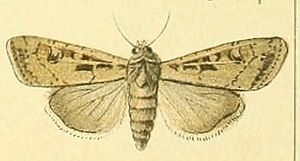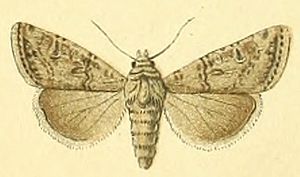Coast dart facts for kids
Quick facts for kids Coast dart |
|
|---|---|
 |
|
| female | |
 |
|
| male | |
| Scientific classification | |
| Kingdom: | |
| Phylum: | |
| Class: | |
| Order: | |
| Family: | |
| Tribe: |
Agrotini
|
| Genus: |
Euxoa
|
| Species: |
E. cursoria
|
| Binomial name | |
| Euxoa cursoria Hufnagel, 1766
|
|
| Synonyms | |
|
|
The coast dart (Euxoa cursoria) is a type of moth that belongs to the Noctuidae family. These moths are found in many parts of the world, including Europe, Asia, and even Canada. They are known for living in sandy areas, especially near coastlines.
Where Does It Live?
You can find the coast dart moth in northern and central Europe. It also lives along the coasts of the British Isles. Further east, it is found in central Siberia, Mongolia, Tibet, and Afghanistan. A special type, called Euxoa cursoria wirima, lives in Canada.
What Does It Look Like?
The front wings of the coast dart moth are usually a sandy yellow color. They often have brownish-grey speckles. Sometimes, parts of the wings can be a darker olive brown. The back wings are usually a dull greyish-yellow. The moth's appearance can change quite a bit. Some might be almost entirely reddish-brown, while others are a uniform brownish-grey.
Life Cycle and Food
This moth flies during the warmer months, usually from July to September. The exact time depends on where they live.
The young form of the moth, called a larva (or caterpillar), is a pale yellowish color with a hint of green. It has lighter lines along its body. These larvae eat many different plants that grow in sandy areas. Some of their favorite foods include Honckenya peploides, Elytrigia juncea, and Elymus arenarius. They also munch on plants like Rumex, Atriplex littoralis, Minuartia pebloides, Cakile maritima, Lathyrus maritimus, and Asparagus.
Subspecies
There are two main types, or subspecies, of the coast dart moth:
- Euxoa cursoria cursoria
- Euxoa cursoria wirima – This subspecies was identified in 1965 and is found in Canada.
Images for kids
 | James Van Der Zee |
 | Alma Thomas |
 | Ellis Wilson |
 | Margaret Taylor-Burroughs |



